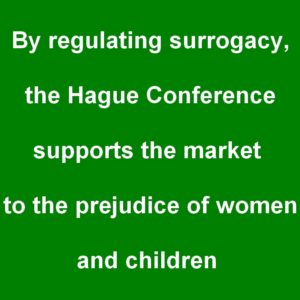The Hague Conference on Private International Law: definition
The Hague Conference has 85 State Members, including the European Union
Its aim “The Hague Conference aims to work for the progressive unification of the rules of private international law”.
It does so by means of international conventions and optional protocols. Definition: “The convention: agreement between States, synonymous with a treaty. It has binding legal force for the States that have ratified it … The protocol: an agreement which supplements an international treaty, a convention, and which has the same legal value as the latter”.
The best known convention drawn up by the Hague Conference is the Convention of 29 May 1993 on Protection of Children and Co-operation in Respect of Intercountry Adoption
When did the Conference come to work on surrogacy?
Extract: ” In 2015, the Council on General Affairs and Policy (CGAP) of the HCCH decided that an Experts’ Group should be convened to explore the feasibility of advancing work in this area. CGAP decided that the Experts’ Group should be geographically representative and be composed in consultation with Members”.
In March 2020, CGAP renewed the mandate of the Experts’ Group for two years and endorsed the continuation of the work in line with the latest report of the Experts’ Group, noting that work should focus on developing both:
- a general private international law instrument on the recognition of foreign judicial decisions on legal parentage; and
- a separate protocol on the recognition of foreign judicial decisions on legal parentage rendered as a result of international surrogacy arrangements.
Chronology of the work of The Hague and feminist reactions
2010 – decision to launch work on the subject of parentage following concerns about “the impact of surrogate motherhood cases on the practical operation of the Hague Convention of 29 May 1993 on Protection of Children and Cooperation in Respect of Intercountry Adoption”.
2011-2014: project preparation
2015: decision to entrust “a group of experts with the task of further studying the feasibility of establishing a multilateral instrument”.
2015: call on the Hague Conference at the initiative of the CoRP collective, signed by many feminist organisations to oppose the Hague Conference’s decision to start working on the international regulation of surrogacy. https://collectifcorp.files.wordpress.com/2015/01/surrogacy_hcch_feminists_english.pdf
2016 to 2019: the expert group met 7 times. It has 22 members (listed at the end of each expert group report).
2018: ICAMS International Coalition for the Abolition of Surrogacy took part in a consultation in The Hague, organised by the NGO ISS International Social Service (observer at the Hague expert group) and defended the need to consider the abolition of the practice, along with the regulatory approach – the only way taken in account by the Hague Conference.
03-2020: decision to extend the work of the group of experts for 2 years with a mandate to develop 2 tools :
- a general private international law instrument on the recognition of foreign judicial decisions on legal parentage; and
- a separate protocol on the recognition of foreign judicial decisions on legal parentage rendered as a result of international surrogacy arrangements.
10-2020: New meeting of the expert group.
October 2020: the ICAMS International Coalition for the Abolition of Surrogacy communicated to the group of experts the draft International Convention for the Abolition of Surrogacy that it had prepared in order to take into account an abolitionist perspective. In support of this, CIAMS also sent this draft to the delegates of the abolitionist member countries of the Hague Conference.
How far is the expert group today?
The draft protocol aims at having foreign judgments on filiation recognised. But it includes a chapter 5 which defines the whole process of surrogacy: article 15: surrogate mother, article 16: intending parents, article 17: contracts, article 18: financial aspects, article 19: genetic link, article 20: origins, article 21: filiation.
What is worrying is that the work is very advanced.
The conclusion of this international convention supplemented by a protocol is a de facto recognition of the legality of cross-border surrogacy and endorses the fact that there are categories of women around the world who are exploitable and specialised in reproduction.
It is a blank cheque given to the market. An obvious green light!
If this work succeeds and is validated by the Conference’s member states, it will be extremely difficult to go backtrack. Of course, the ultimate decision rests with the governments, but among the 86 members of the Conference, who will oppose it?
Civil society and more specifically feminist organisations have never been consulted. The documents sent by ICAMS or by feminist organisations (see chronology) have never been taken into account by the experts, a sign of clear disregard for human rights issues, women’s and children’s rights.
Another point: it is not logical for an institution specialising in private international law to deal with a subject that falls within the scope of fundamental human rights.
It is also worrying that the Hague Conference, praised in 1993 for its convention “on the protection of children and cooperation in intercountry adoption” which aimed at putting an end to international child trafficking, should come to regulate a practice that organises the sale of children and the instrumentalisation of women.
Working group, the expert group’s sense of humour!
Some experts suggested that references to “surrogate mother” should be more neutral and suggested considering the possibility of using other terms such as “surrogate” or “surrogate woman”. »
It is a negation of motherhood!
“The Group reaffirmed that any future protocol on parentage established as a result of an international surrogacy convention should not be considered as a means to promote or oppose surrogacy. »
With this sentence, the expert group is obviously disclaiming any responsibility

